A Helper’s Story..
We are grateful to be able to share with you this personal story by Matt Melton. He came as a general helper and a late replacement for a member of our Blue team. He did not have the benefit of any orientation meetings, or prior association with any of our mission veterans. He arrived in country with the group, in the dark, at the tail end of a hurricane, and to a base camp whose generator had shorted out in the storm. Not an easy start for anyone..
Amongst Princes
One layman’s experience on a medical mission abroad.
by Matt Melton
There’s a light somewhere outside, cutting through the downpour of rain, making its way through the slats of my temporary housing, before finally penetrating the fine mesh mosquito netting of my bed. As I lay here, I can see the silhouette of a small lizard, possibly a gecko, clinging to the outside of the netting. Or at least I hope it’s on the outside.
A few cots away I can hear the snoring of a doctor, but his tempered breathing cannot compete with the thunderous sound of the rain. It’s the kind of downpour that I haven’t experienced since childhood and I’m instantly transported to a memory of summer camp. Instead of a bunk however, I’m in barracks. Instead of upstate New York, I’m in the Dominican Republic.
It’s my first night on the outskirts of Dajabon, a city of about 60,000 locals in northwest DR, on the border of Haiti, and tomorrow morning marks the start of a week-long endeavor on a medical mission. But I can’t seem to get past this rain. It’s been utterly relentless since we arrived earlier this evening and I’m mesmerized. As I rarely take anything at face value, I start to get the sense that this rain is more than the outlying effects of tropical storm Tomas, which is currently pounding an already ravaged capital city of Port au Prince, Haiti. This storm knows I’m here. And these raindrops are for me. It’s a cleansing; of all my frustrations, failures and fatigue. And as a solitary tear of understanding and hope forms in the corner of my eye, one drop to connect me to the very rain that inspired it, I’m able to take a deep breath and drift off to sleep for a few hours as I await tomorrow, the first day of our mission.
I’m not a doctor, nor will I play one in the Dominican Republic (despite the recurring fantasy I’ve experienced for two weeks leading up to this trip: “Matt, quickly, we need your help, one of the doctors just fainted– you need to scrub in immediately – breathe and relax, and the nurse will talk you through this operation”). Instead, I’m just a helper; a volunteer willing to do whatever is needed to ensure a smoother mission. A layman surrounded by doctors, nurses, and translators in a foreign land.
As the rain ushered in the morning and once again reminiscent of camp, we’re awoken at the crack of dawn by our leader, and counselor, Dr. Michael Bourque, and some accompanying music I can’t quite make out in my early morning haze. Dr. Bourque is a small man with a quiet disposition and voice similar to that of a boy going through puberty. And yet, he has a tremendous heart, and strong desire to help those in the world less fortunate. And by all accounts, (over four hundred patients whom we would see, help, and treat over the coming week), he’s doing a fantastic job. But it’s only his second mission as a leader, and as the week progresses, it would become evident that his sophomore outing was not without its fair share of glitches, hiccups and frustrations. All of which would surely be discussed and adjusted prior to forthcoming missions. This trip will be as much a learning experience for him, as it will for me.
Without running water to wash away a rugged 18-hour commute that consisted of planes, trains and automobiles, I dressed, and sheepishly made my way down to the dining hall for breakfast. Idle chitchat about the rain superfluously fills the voids as we eat, while we all mentality prepare for our first day. Looking around, I feel somewhat alone, yet I’m unable to recognize that the feeling is, in all probability, shared by a handful of the volunteers who I accompanied on this trip.
I’m here by chance: the lucky recipient of a spot originally offered to my mother. A journalist and English professor, she was contacted by Bourque this summer after publishing an article on the very type of mission of which I’m now a part. Most likely in search of some publicity for his own cause, and perhaps a sponsor to subsidize the fifteen hundred dollars paid by each missionary member, he invited her to go on this next mission. She gracefully declined the invitation. Having shared this story with our family at our beach house over dinner, I jumped at the opportunity. As I had been sufficiently drunk at the time, she needed only to double check my sincerity as I stumbled down the stairs for coffee the following morning before putting me in touch with Bourque. My desire to go on this trip stemmed from the most sober of places in the most drunken of times, but the rationale behind that desire had not yet revealed itself, or if it had, I wasn’t aware.
And so here I am, having breakfast with a group of people I’ve never met before, struggling to understand my reasons for embarking on this trip. Am I here to help those less fortunate in a far off land? Surely I won’t be nearly as helpful as a doctor, touching lives like the hand of God. I shut my eyes and swallow some eggs prepared by the local Dominican staff in our grand open-air dining hall, nestled amongst giant ferns in the mountainous region of this country.
When I open my eyes, I survey the group- just about everyone is engrossed in conversation all around. As a closet introvert and self-proclaimed underachiever, it takes only a few seconds before I feel like the very thing I was hoping to escape. Myself. And in an instant, I know why I’m here. Sure, I want to help those we came to treat. And yes, of course I want to make a difference. But I’m secretly hoping this trip will be the catalyst of something bigger for me. This trip has the potential to ignite something within me, and I’m here, searching for that spark. Searching for myself. And yet, as I sit here, I can’t help but feel I’ve traveled thousands of miles only to feel exactly the same. This seems unfair, yet perhaps understandable if not unavoidable. After all, and as the saying goes, “Wherever I go, there I am.” Ironically, to achieve the type of personal growth and change I so desperately seek, perhaps all I need is to simply get out of my own way.
Breakfast is followed by a few announcements, and we’re given our assignments and some directions. There are two destinations – the hospital and the clinic, and our group will be divvied up accordingly. Whereas the hospital is stationary, an abandoned wing of a rundown medical facility, the clinic is a traveling road-show, converting churches, schools, or other public municipalities into working field clinics in surrounding villages; a new location each day.
On this day, I’m assigned to the hospital, and will be transporting patients on stretchers from surgery to the PACU (post anesthesia care unit), more commonly referred to as the recovery room. Mind you, I’ll soon find out that the O.R. and the recovery room are about 15 yards apart- so my role is somewhat akin to a baseball game: Three hours long, 10 minutes of action.
Our drive to the hospital is bumpy if nothing else, and some of the nurses can’t seem to get over the cows.
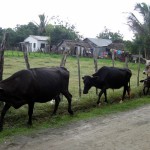
Cows
I’m not sure why we have such a fascination with cows, but I notice they’re doing little more than the people who own them. Every so often we pass a diminutive structure hugging the road, where there are inevitably one, two or even three people sitting and watching the very same road. They wave, and we wave back. This continues for the duration of the drive. Cows and waving. Waving and cows. If baseball is quickly becoming the national past time in the Dominican Republic, standing around watching cars pass by is right on its heels.
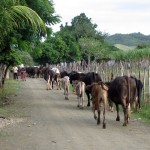
More Cows..
While it’s only said to be twenty minutes from camp, we’re on Dominican time now, so the trip is in actually closer to 45 minutes. Finally we arrive at “Subcentro de Salud Los Almacigos,” a health center in the town of Los Almacigos.
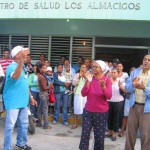
Greeting by the Waiting Patients
There are close to 30 locals awaiting our arrival, and after we’re all off of the bus, Teo, a doctor, liaison, and head of the missions in the Dominican, is there to greet us. His deep voice reverberates exactly like James Earl Jones, and you get the sense he could treat patients simply by waving a hand in the shape of a rainbow and conclude by saying, “You are all cured. Be well my children.” He starts us off in song. And just like that, we’re united together with the Dominicans. Singing and clapping. Clapping and singing. And waving.
We have close to, if not more than 25 medical duffel bags with us, which we proceed to unload, and before long we’re disinfecting every inch of this dilapidated hospital wing.
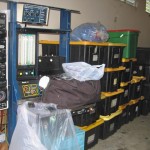
Equipment Waiting Unpacking
I thoroughly wipe down beds, tables, walls. I clean the rust off IV stands. Everyone seems to have a purpose, but before long I find myself roaming around, looking for something to do. Kathy, a head nurse and instrumental member on this trip, similar to many before, is barking orders. This is clearly her hospital and we’ll be doing things her way. “This room’s the O.R. PACU will be there. Lumps and Bumps will be done over there. Where are the bovies. HAS ANYONE SEEN THE BOVIES?” Lump and bumps and bovies, oh my… god. What have I gotten myself into?
It doesn’t take long for the leader of the pack to sniff out the weaker dogs, and it’s clear she’s sized me up and determined that as the runt of the litter, I won’t be of much help other than the transporting duties to which she assigned me. Meanwhile, the other two general helpers are middle-aged men, both about six foot two with gray hair. They’re essentially twins and have hit it off fabulously. Somehow, they’re of the same mindset as Kathy, and it’s not long before they feel comfortable enough to give me tasks. An assistant to the assistants. I’ve traveled thousands of miles to become a junior orderly in a third world hospital. Am I really touching lives here?
Just as I’m about to hit the bottomless pit of despair, I’m lifted by Alley–a jovial nurse, with a similar role as Kathy, on her eighth mission.
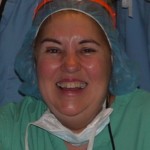
Sharon Allard (Alley)
She’s loud, bigger than she once was as she puts it, and more than likely, has three cats. “Where’s Matt? I need Matt,” she says to anyone listening. “This guy is like Tinkerbell. Anything I need, he’s right there over my shoulder with it.” In an instant, I’m by her side. “Tinkerbell? Wanna try again?” She smiles and after she makes a few similarly emasculating attempts, I reluctantly agree to “fantastic little helper.”
In just over three hours, we’ve turned this abandoned hallway and adjoining rooms into a fully-operational hospital, capable of triaging patients, prepping them for surgery, operating, and seeing them through post-op to discharge. The surgeons and their staff are ready, if not antsy, to operate. Two translators are down the hall by the entrance, working alongsidede nurses to consult and subsequently triage patients. A clipboard outside of the two O.R.s takes the place of a giant whiteboard, showing the surgeries for the day. My fellow helpers have been assigned to scrubbing the blood and guts off of post-op instruments. Suddenly my fifteen yards of glory seem like a victory lap.
Surgeries are under way, and I’m roaming round, trying to find something to do, and if there’s nothing, I can at least look busy. At some point, I find myself in a conversation with the co-leader of the group. Dr. Michael Tesoro is a man who seems to command respect, and yet, by all accounts, is a total goofball. He towers over me physically, and I feel very small, literally and figuratively. What could I possibly have to say to this guy? Our conversation quickly and naturally turns to that of our hometowns. And then in one word, it’s like I’m sitting at a poker table with the defending champion who has just accidentally shown me his cards. I know this hand and I’m all too familiar with it because it’s quite possibly my father’s favorite noun. “Brooklyn,” he says–I keep my poker face but I’m all smiles inside, because I know there’s one topic that every born-and-bred Brooklyner loves to talk about, and that’s Brooklyn. I don’t have to say another word for 20 minutes and when this fantastic conversation comes to an end, he’ll walk away as happy as a nine-year-old kid taking the subway to Coney Island for a nickel on a hot summer’s day. Casually and confident, I go all in. “Oh yeah? My fathers from Brooklyn–Flatbush Avenue and Kings Highway.” The discovery that they went to the same high school was just icing on the cake. And that, as they say, was essentially that. As I’m called away to move the first patient out of surgery, I hear him say, “I knew you were a good kid.”
The rest of the day is uneventful but I’m well aware of the miraculous work going on around me. These doctors and nurses are literally saving lives that otherwise might not have been saved. Helping those who otherwise might not have been helped, and I feel completely out of place. Before long, were wrapping up and on the bus heading home–I’m seated next to Linnea, a young ultrasound tech who has a passion for scanning anything and everything. She looks as uncomfortable as I feel, but we find some common ground in our iPhones. Phones, carriers and service will prove to be another big topic of conversation throughout the week, along with that of the snoring. “I can’t get service.” “Who do you have?” “An international plan?” “It worked at the airport.” Even here in the mountains, away from the rest of the world, we’re a people obsessed with our cell phones. There’s more to Linnea than just phones however, a life left behind perhaps, and I’ll spend additional time over the coming week uncovering the story behind her wrist tattoo “Never Again,” wondering about the placement of her once seventeen piercings, and trying to understand her, and the interesting relationship she has with her doctor husband Tom. Either way, I like them both. Linnea’s done ultrasounds on countless pregnant bellies, but has never before seen a placenta in person. She wants nothing more than to see a placenta and as strange as this sounds, it fits completely with her personality. I find myself praying for placenta.
We all congregate in the dining hall, united once again with our road-show clinic counterparts.
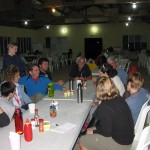
Eveming Relaxation
Prior to dinner, Teo comes to the front, and along side doctors Bourque and Tesoro, recaps the statistics. 38 general patients, 15 parasite treatments, 42 consults, 4 major surgeries. Not bad for the first day. Only four more to go. I’m not sure if that’s a good thing or a bad thing. Everyone is exchanging stories of the day and I find myself once again retreating into my own world. A pre-dinner drink would be perfect right now, but this is a dry mission and so I’m on my own. As dinner is served, a delicious combination of rice, spiced chicken, and fruit, I find myself looking for and ultimately sitting with Alley and whoever is with her. Dinner ends, and while some people head off to seek refuge in their netted beds, others break off into smaller groups. Although I crave for the comfort of my bunk, I force myself to join a few people at one of the back tables. Ed and his step daughter Shannon, both doctors, are amongst the people I sit with. They’re inviting and warm, and the conversation is comfortable enough.
Somehow the conversation reminds Ed of a joke, which he shares. “America and Russia are face to face in the finals of the world wrestling championships…” It’s a good joke delivered simply, and gets a good laugh out of us. As the conversation comes to a lull, I excuse myself, and head to my cabin.
The staff managed to fix the water during the day, so I force myself to take an ice cold shower. For as many showers as I’ll take on this trip (two a day), I won’t get used to this. If I enjoyed masochism I would consider employing this tactic at home, as it shocks the sleep out of you in the mornings. After drying off, I retreat to my bed, which has proven itself to be my favorite place so far. The netting provides a sense of security and safety, and I have everything I need at my finger tips. Bug spray, sanitizer, flash light, watch, earplugs, a book, and my iPad. I reach for my book for the first time since the airplane – a Dean Koontz airport novel if ever there was one, but quickly realize the thriller’s setting was uncomfortably close to the one I was in, and so I opt for a movie on my iPad. I stay up late into the night, and am slow to admit that my habits are mimicking those at home on week nights– as long as I’m awake, the next day won’t come. But it’s a double-edged sword, as I’m bound to wake up exhausted.
Without the background of rain, the snoring in our barrack is unconscionable. Of the ten or so men sharing the sleeping quarters, approximately half are sound asleep and subsequently keeping the other half wide awake. It’s a symphony of snores, a cacophony of croaks, and finally I find some respite in my earplugs.
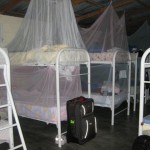
Dorms
Once again its morning, and routine is quickly taking shape. Dr. Bourque enters the bunk at 5:30am, and I recognize the music this time–“Viva La Vida” by Coldplay. I don’t immediately get the context, but I pick up the lyrics in my head where the song trailed off upon his exit… “Be my mirror, my sword, my shield, my missionaries in a foreign field.” For some reason I can’t explain, I force myself out of bed and into a cold shower. There’s some commotion in the middle of the barrack – and it’s only a matter of minutes before we’re all gathered around Vic’s bed. Vic’s one of the twin helpers, and as I’ll soon discover, a neighbor of my parents. I like him and enjoy our simple and lighthearted conversations and he takes on a bit of a father figure role for me. He’s got a visitor on the wall next to his bed in the form of a giant arachnid. None of us know how to handle the tarantula, so after a few photos, we all back away.
We make our way to breakfast, and then into the buses. The sun is out and the ride is nice. Routine brings comfort, and singing with Teo. Once inside, we start prepping for the day. “Matt? Where’s Matt?” I hear my name being called – it’s Alley. Apparently there’s a shortage of doctors, and they may actually need me to hold the retractor on a gallbladder surgery. She teaches me how to scrub in. I’m primed and ready, and this keeps my adrenaline going for a couple hours. I have no doubt I can step in and do this should it come to that. Not quite my fantasy, but damn near close (enough). I push out of my mind the fact that I couldn’t dissect a frog as a kid, as I was completely nauseated. “You think you can handle this?” asks Alley? “Oh, absolutely” “Good, eat something. People have been known to pass out.” I down a CLIF bar, happy I won’t faint, but now concerned I might vomit.
My opportunity never comes, but I do find myself assisting the nurse in the lumps and bumps room (think people with big lumps and/or bumps looking to have them removed). I’m opening local anesthesia medicine, I’m passing sterile needles, sutures, sponges; I learn about the responsibilities of being a circulator–the person in the O.R. responsible for counting “sharps and softs,” and ensuring all instruments are accounted for and nothing is left behind. Or, in honor of Jamie, a young, easy-to-like colo-rectal specialist from New Orleans, left… in the behind.
On a subsequent bus trip, I learn that Jamie likes the job security that comes along with being a colo-rectal surgeon. It’s not exactly a favorite for those out of residency, so the demand remains high. Jamie’s not sure how she became a surgeon, and still thinks she has everybody fooled. I feel the same way about my job, with one lone exception – I’m not sure I’m fooling anyone, except maybe myself.
Two routine but relatively serious surgeries are going on concurrently, a hysterectomy and a gallbladder. Each is taking surprisingly longer than expected and tensions are starting to build. This tends to happen when complications arise during surgery in third world counties when you’re lacking the proper surgical utensils and you have three surgeons- one new, one experienced, and one retired, scrub in on the same procedure. After a few hours, the ruckus of the hospital becomes ambient noise, that is, until the generator shuts down and the power goes out. It’s eerily silent, and then, much like cell phones before the encore at a concert, flashlights start to turn on and people go running into the ORs to provide additional light. The power is out for just a few minutes, and the patients make it out of surgery okay. I know this because I pushed them down the hallway.
With the surgeries over for the morning, it’s lunch time and I’m amazed how the doctors can come out of surgery, literally having just had their hands inside of someone, and in the blink of an eye be ready for a ham and cheese sandwich, rather, a cheese and ham sandwich (as it was ham and cheese we’d had for lunch on the prior day). We congregate outside of the ORs, around a hydraulic stretcher-turned-table –home to a water cooler, snacks, lunch, and daily bags of snack-sized candy.
Even Anita, the petite Buddhist vegetarian surgeon, whom I took an instant liking to, enjoyed some candy.
It would be the following evening that I would engage in a one-on-one conversation with her after dinner, drawing from my limited knowledge of eastern philosophy and bringing up names like Eckhart Tolle and Thich Nhat Hanh, and discussing Karma, to seal our bond. A mosquito would fly between the two of us, as I quickly brought together my open hands on the pest. Ten minutes later, our conversation turned to animals and love of dogs (she with eight) and I tried to forget my earlier bug attack as she casually mentioned she doesn’t hurt insects anymore. If she judged those who do, I believe I may have been a lone exception that evening. I could tell she liked me as well, which felt good. I hope to take some of her mindset with me.
I’ve had a low-grade headache all day, and true to form, this is one that won’t go away until I’ve slept it off, and so it will linger, and I’ll linger with it. In the hallway. There’s a fair amount of downtime; not only for me and the twins, but for some of the medical volunteers as well. It doesn’t help that we’re a bit overstaffed, but Bourque is still new at this, and they haven’t found the ideal ratio for volunteers to mission yet. This will be in my evaluation. I’m hungry again and grab another cheese and ham sandwich, which if nothing else, gives me something to do for ten minutes.
Suddenly there’s a murmur spreading in the hallway. A local lady collapsed and died in the parking lot. Cause, unknown. But what makes it supremely unfair is that she and her family were here visiting a sick family member in one of the existing (semi)operational wings of the hospital. Or at least that’s one of the versions going around. It’s not long before two Dominican men pass me by, carrying the woman’s body on a stretcher on their way to the morgue. I’m not sure we ever got a validated account of what happened, and I’m not sure it matters. It was tragic and sad regardless.
Once again, afternoon turns to evening, and after transporting the occasional patient, scrubbing some instruments and doing whatever else is asked of me, it’s time to head back to camp. The night is relatively uneventful and after another tasty dinner accompanied by an hour long story from Alley about her broken ankle and a witch doctor in Cancun some years ago, I retreat to the safety of my bed. In retrospect, I loved listening to Alley. Her story, which if she ever penned would be a five part mini series, kept me occupied and safe from the dangers of having to initiate an empty conversation with anyone else.
It’s morning once again, and I’m curled up in the fetal position. God I want to go home. I shouldn’t be here, I don’t fit in, and it’s obvious. And yet, someone the previous evening made mention of my outgoing personality. After breakfast, Terry is summoned to speak. Terry’s the king of the snorers, and one of the more experienced mission-goers. He works in a hospital as an ER administrator, and has spent hundreds, if not thousands of hours abroad in the DR and Haiti, amongst other places– rebuilding facilities, handing out food, and participating in medical missions – anything and everything. He is a solitary man in his late fifties, with gray hair and a full physique. Terry has found God, is committed to his church, and in the truest sense, finds happiness not by helping himself, but by helping others. He could help me by snoring a little less. He speaks with projection in his voice, and the confidence of a preacher. “Today marks the middle of our mission. Some of you may be wondering why you’re here. You may be struggling with your decision to come. You may even want to go home.” Is he talking to me? Did I confess something to him in my sleep? His words are so poignant and pinpoint accurate that I can’t help but wonder if most of my own problems are in my head. I discount that thought immediately. My own internal struggles are real, and my burden to bear. The karma Anita and I touched on surrounds me, and it’s generally more negative than positive. I tell myself that giving back, helping others, will free me from any negative energy I’m harboring. Bullshit. But I’m willing to entertain the possibility, and Terry’s words were music to my skeptical ears.
Back to the hospital and my name is called–Kathy is ordering me into the OR. Hat, mask, booties, the whole nine yards. They’re inviting me to watch a hernia operation on an eleven-year-old boy. Jamie and Dr. Bob, an extraordinarily nice man and retired transplant specialist turned painter and ballroom dancer who was a pioneer in the field of liver transplants back in his day, are at the table, with an anesthesiologist at the head. Alley is across the table next to Dr. Bob, handing him and Jamie any instruments they ask for. Kathy is sitting at the foot of the table, playing the role of circulator and meanie. “Don’t move. Don’t touch anything. Don’t do anything unless I tell you to.” Ok, ok… I get it. I also understand the reason for her directions. There’s an open human being a foot in front of me. I watch intently. It’s quite amazing, and I’m grateful for this opportunity. It’s not every day that the layman can observe a surgery standing next to the very surgeon doing the operation.
I bring up the subject of circulators. I ask Kathy how many sharps are on the table. She answers what she thought was a question. I inform her that I was quizzing her, not asking. Alley laughs and my point is made. Some time passes, and I’ve made my way around the table (when Kathy momentarily stepped out) and am now behind a shoulder-high drape bisecting the boys head from the rest of his body, and getting a lesson in anesthesiology. The conversation turns to Reiki, an ancient Japanese art of energy healing, practiced both by Alley and Kathy. Once Alley gets started on a topic, there’s no stopping her, and she’s talking about energy balls. Jamie, whom I am in direct eye contact with, is smiling under her mask and winking at me as if to say, “energy ball shmenergy ball.” I use my calves to lift myself a few inches, and then start moving around on my toes in a circular motion. “What are you doing” Kathy asks. “I’m levitating on my energy ball.” Jamie laughs. Alley laughs. The surgery goes and after the better part of an hour (or two?) and they finally close the boy up.
It’s lunch time, and in comes another round of ham and cheese. There’s a rumor that we’re going to be doing a c-section, and the OBs are over-the-moon. So is Linnea, because this might mean she’ll finally get to lay her eyes on the elusive placenta. The rumor proves to be true, and an expecting mother is walked into the O.R. People congregate in the hallway. Everyone loves a baby. Cameras are readied and there’s excitement in the air. I’m talking with Linnea and I share the story of my tattoo. In turn, she shares hers. I ask leading but innocent questions to find out more about her. I’m piecing the puzzle together in my head. It’s not long before we hear the cries of a healthy baby boy, the third from the teenage mother. Shortly thereafter, mother and baby are wheeled out on a stretcher. Uh oh, how did that happen? Wasn’t that partly my responsibility? Seeing as five people accompanied her, I figure all is ok. Dr. Bourque peaks his head out of the O.R. and asks Linnea if she’s ready. Baby boy is she ever. He retreats momentarily and then the door opens and out he emerges carrying a still-warm placenta, complete with umbilical cord. Curiosity hits me, along with a few of the earlier naysayers, and we take a look. Yep. It’s a placenta. And it’s downright gross. Linnea is snapping shots of it with her iPhone, while Dr. Bourque is turning it around, pointing out the different parts. I ask her if she’d like a photo with the placenta. Someone laughs, she nods. Say cheese, placenta.
Another day, and I’m in awe, if not a little jealous of the people surrounding me. They’re truly miracle workers and I’m glad to be part of this undertaking, despite my ongoing struggles of feeling inferior. We head home for another tasty meal. Ken, the other twin, and husband of a different Kathy who works as a pharmacist in the clinic is retelling his story of how he created an exam room in the clinic that day. Ken’s mister fix-it, and overzealous helper in general. He stacked table bottoms or something, and fastened them together with zips, and clearly it’s such a feat that he’s sharing his accomplishment with everyone.
After dinner, I find myself amongst a group of fifteen to twenty people. They’re telling jokes, and in a moment of silence Kathy yells out “Matt, you tell one.” “Really? On the spot? Hmmm…” All eyes are on me. There was a day when I had a dozen jokes, if not two, at the ready. Jokes in all shapes and sizes. Dirty, clean, short, long. But that was long ago, and at this moment, my memory fails me. And then it hits me. I don’t need to look around, as I already know who is and isn’t among this group. “Ok, I got one…” I say with a smile. “America and Russia are face to face in the finals of the world wrestling championships…” I tell the joke with energy and passion. I use my body. The words come back to me as I’m retelling the joke, almost like a train whose tracks are being laid down as it’s moving, and I make them my own. I’ve got everyone’s attention and I deliver the punch-line flawlessly. It kills, as they say, and everyone is laughing. A couple days later when I have the opportunity, I tell Ed, and thank him for the material. He laughs and is glad it went over well.
The evening ends and despite the good, I still struggle with the bad. Go away bad karma. Go. In the morning I’ll be taking my act on the road–to the clinic, and I can’t wait.
Routine is in full effect by now – wake up around 4:30, hear the camp generator kick on and watch for a light in the distance. Make my way to the bathroom, and then lay in bed for an hour, waiting for Dr. Bourque and Coldplay to arrive. After breakfast, we make any final personal preparations for the day, before congregating around the buses. To the hospital will go a mini tour bus, or more appropriately, something akin to an airport shuttle. The clinic gets the school bus, which when not running is being worked on.
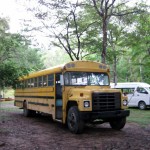
"The" Yellow Bus
As surgeons and their support staff are needed at the hospital, the clinic group has its own needs and stays relatively the same with rotations such as myself happening each day. This is an opportunity to interact with people I haven’t really had the chance to meet. It’s a bumpy ride through the country and I quietly take in the sites. In front of me is Kay. She’s a nurse, and possesses all of the qualities a young child hopes for in a grandmother. Self-deprecating about her weight (“Of course I’m sweating. Fat people sweat,” she would later proclaim to Dr. Tesoro who along with Dr. Bourque came on this outing), and generally happy in her demeanor, I find it easy to talk with her. We make small talk, starting with how I came to be on this trip, a story that would roll off my tongue at least 30 times during the week.
Upon arriving at the clinic, a small church approximately the size of half a basketball court, we start to unload. A dozen or so wooden light green boxes are brought in and set up on their stands against the wall of the recessed alter. Once opened, they reveal medications of all types, and the two pharmacists start organizing their area until it turns into pharmacy. On this day, many prescriptions will be written, filled.
In the center of the room, chairs are arranged in two groups of four, and will each accommodate a doctor, a translator, and a patient. We need to create an examination room. The back corner of the wall opposite the pharmacy seems to make sense and we spend time debating how to make it private. I’ve brought my leatherman and some rope and together with a king size sheet and some clothes-pins (easy enough to find as drying laundry outside is equally if not more popular here than baseball), I’m able to create a hanging drape that cordons off the corner. Simple, but impressive nonetheless and several people comment on the superior quality to that of Ken’s work the previous day. I thank them, but brush the comments aside–it’s just a sheet and some rope, and doesn’t deserve any more excitement, at least from my perspective.
In the back yard, we’ve set up a sign-in station, a weigh-station, and a vitals-station. Patients will make their way through those stations in the same order. After that, they will register their chief complaints with a translator before ultimately being routed for an exam, consult, prescription, or dentist, also set up in the back yard. After more singing, we’re open for business, and the people who were informed about our visit a week prior at church, start showing up. I’m on weighing duty, and it gives me a chance to speak some Spanish with the locals. The weather is nice, I’m consistently busy, and feel significantly more helpful than I have felt at the hospital. Older people arrive, younger people arrive, families, and individuals. Children show up and it’s not long before I’m entertaining them with the few magic tricks I know. I’m putting smiles on their faces while they await examination. I’m making a difference. The day ends as pleasant as it began, and we’re packed and on our way home by 4:30 – at least a couple hours earlier than those from the hospital.
It’s nice to have the afternoon off, and we sit around the dining hall chatting for a while, as the rain once again returns. It’s an early dinner for us, while we await the return of our hospital counterparts. Ken returns and people say he’s been knocked off his perch. That I’ve erected the perfect examination room. I smile and steer the conversation to something else. Once again routine kicks in and it’s not long before I’m back in the comforts of my bed.
Our final day starts just like any other, but today will be a short day. A couple of surgeries and then we pack up our hospital supplies. We’re down to about half of the bags we brought, and packing goes relatively smoothly, along with the help of the clinic workers who had shut down earlier in the day and joined us at the hospital. All non-essential people board the yellow bus, and we’re heading back to camp about 3 pm, prior to a short excursion to Dajabon, where we’ll get to see the Haitian border.
When we arrive at camp, Liz, a well respected OBGYN informs us that there’s been the first documented case of cholera in Dajabon. At first, some of us are wary, but Linnea’s husband Tom chimes in. I like Tom – he’s soft spoken, has long hair and I can easily see how the two of them met in a heavy metal music scene a couple of years ago. He was previously married with a child, and together they have a son, who coincidentally is also two. “Cholera is…” and he effortlessly recalls from memory a textbook definition. He goes on to tell us exactly how it’s spread, and how it’s treated. By the time he’s done, we’re all experts, unconcerned, and we’re back on the bus.
The border is an experience. Two countries, separated by a river.
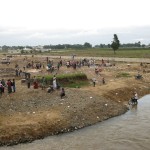
Haiti Viewed from the DR Side
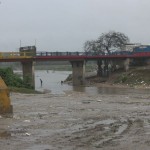
At the Bridge Between Haiti and the Dominican Republic
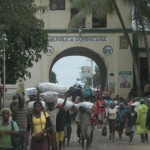
The Border Crossing
Despite what we’ve heard in the news, the border is not closed, but it’s late in the afternoon and the gate halfway down the bridge will be closing for the evening as it does each day. Foot traffic is moving predominately one way, and we watch as Haitians, mostly young men are carrying food back to their country. Live chickens are passing us by. Forty to fifty of them, tied to a stick and resting across the shoulders and necks of these boys.
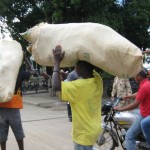
Bags of Produce
Grains in satchels. They’re rushing to get back, as they don’t want to get stuck on the wrong side for the evening.
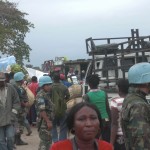
UN Peacekeepers on the Bridge
Standing on the bridge, I can see a U.N. jeep and guards on the Haitian side. Garbage is strewn everywhere and hundreds, perhaps thousands of people are standing around waiting. Free, yet without basic necessities. Food, water, a place to sleep. After an hour, we board the bus and return to camp.
Back at camp I doze for a while, and Vic awakens me when it’s time for our final dinner. The later group had finished at the hospital, gone to the border and just returned. After dinner, we congregate as a group. Dr. Bourque speaks and Teo recaps our totals. We’ve done well, and helped so many people. Brian, Dr. Bourque’s son, along with his Chilean friend and second time missionary Juan Carlos, both acting as translators on this trip, breaks out his guitar. He plays a few songs, starting with a parody of the week. Together, he and J.C. make fun of the generator, remind us of the tarantula, and hint at the snoring. It’s a fun song and it elicits laughter from everyone.
After that, first timers are awarded a pendant made of silver. We’re called one by one, and each of us receives an applause as we shake hands with Dr. Bourque while Kathy hands us the pendant in a satchel. It’s my turn and the applause is robust, complete with a few woo-hoos. I’m not sure why I’m receiving such an energetic applause, and I’m trying to figure out if I’m unanimously viewed as the little engine that could, or because I’m energetic, fun and outgoing, as a couple additional comments throughout the week would suggest. I move out of my own way and retrieve my pendant.
We’re each given a final opportunity to speak, a chance to talk about our experience. What we learned, what we got out of it, what we’ll take with us. One by one, people speak. Some offer quick thank yous, while other’s words are slightly more drawn out. Some people choose not to speak. I’m immediately anxious, and try to think of something to say. I’m too nervous for this, and I decide I’d be better off not talking. Or would I? While the structure of a speech comes to me, the words, a moshpit of ideas in my head, are failing to fill the structure I had concocted.
As the evening draws to a close, and into the next day and night (spent in a mid-level all inclusive resort as a final thank you to everyone on the trip), a handful of people approach me…
I came here with the loose understanding that I’d be going on a mission to a third world country with a group of doctors and nurses to help save lives. The first few days were difficult. I watched as they all worked in sub-standard conditions, with limited instruments, and performed the very same surgeries as we do in the United States. Hernias, hysterectomies, gallbladders, and even a couple of c-sections. They worked with blinders on, and got the job done. And I felt useless. I felt… like a man amongst princes, so-to-speak. And then there was Terry, and his words– like he was talking to me, and me alone, yet I knew there were others who probably felt the same way. And as the days progressed, I came to realize that all I could do was my best, in the capacity that I could, in the context of this mission. At some point mid-trip, it occurred to me that this was exactly what all of the people I was with were doing. They were doing the best they could. Some more experienced, some not, but all working together towards the same goal. So while I came to the Dominican Republic with a group of doctors and nurses, in the end, I left with a group… of helpers.
…The people who approached me all said the same thing. That those words, the words I spoke that night, were some of the most powerful and honest they’ve heard with regard to this mission, or any other. I really need to get out of my own way.
Footnote: I’m tremendously grateful for the opportunity I was given. This trip was an amazing experience and I was surrounded by great people doing incredible things–all working together for one united cause. Despite the overstaffing, and other hiccups, Dr. Bourque is off to a fantastic start after having been mentored for years by another very experienced missionary doctor. He’s a kind and gentle leader, and I think that’s the type of person needed to pull off a trip of this nature. Maybe I’ll spend the next year brushing up on my Spanish so that I can return as a translator, and with a sense of purpose, which was perhaps one of the bigger internal struggles I experienced throughout the week. Maybe, I’ll come to find that I brought a sense of purpose home with me. I was honored and proud to be working side-by-side with my fellow helpers and I will not soon forget this trip, as it was so much more than that.
Addendum: All who serve on third world mission trips can benefit from Matt’s heartfelt words and thoughts. While each trip takes almost a year of planning, when put up against mother nature and the poverty, and the unpredictable conditions we face, nothing ever goes the way we outline it on paper. By posting his story here, I think Matt will be pleased to know that his words will help countless first time missionaries going forward on future trips. His moving day to day accounting of what we do and what we strive for, makes him a special person who has truly earned his position as helper and missionary. We welcome him back anytime he wishes to serve again..
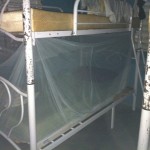
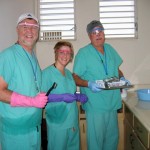
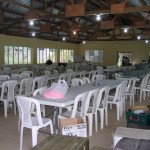
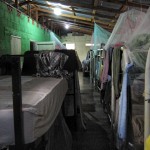
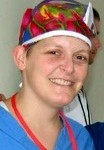

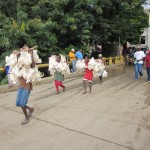
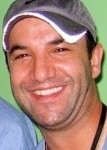
Comments are closed.